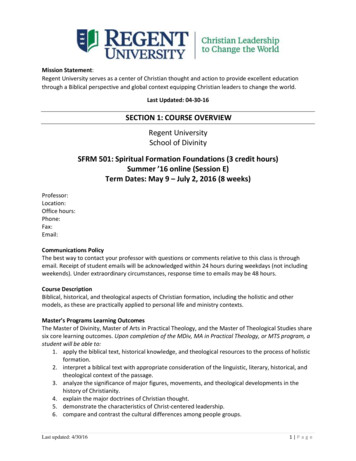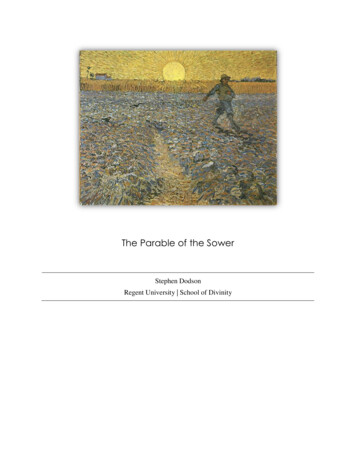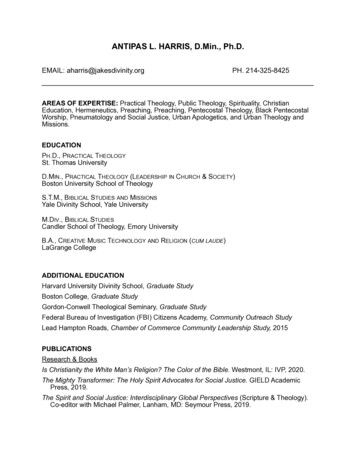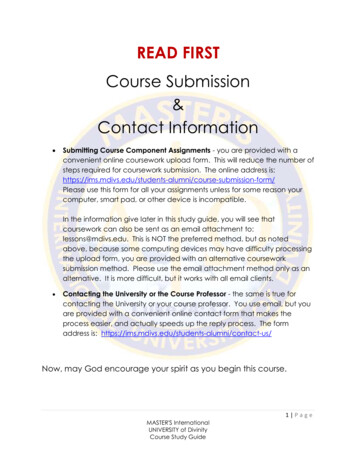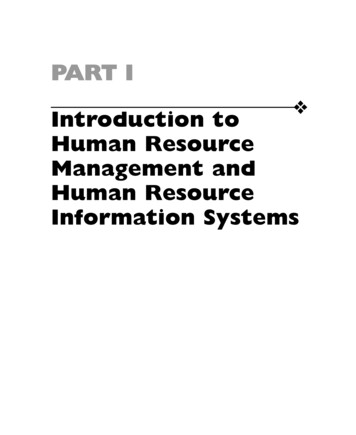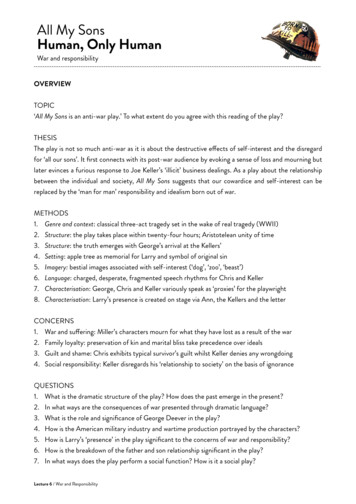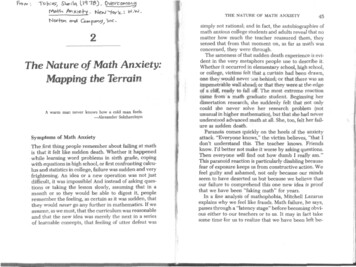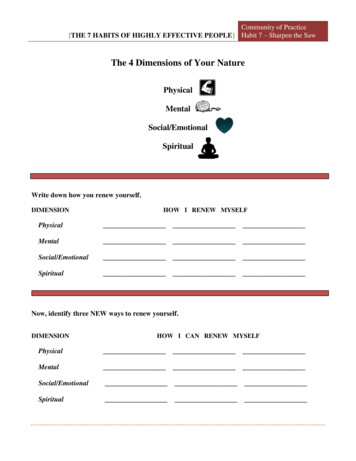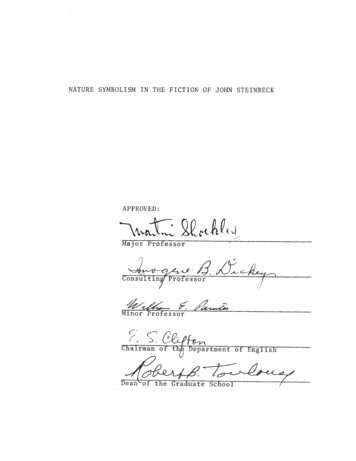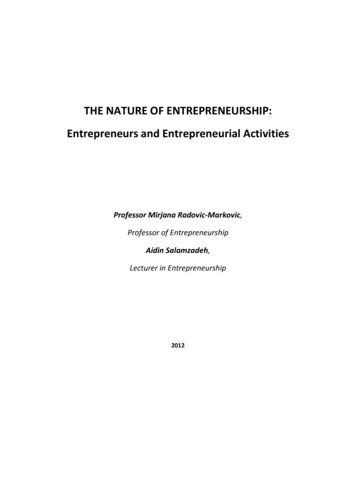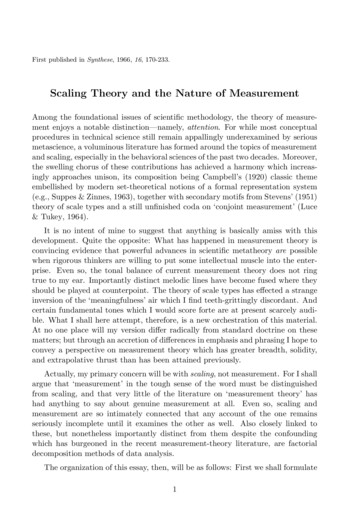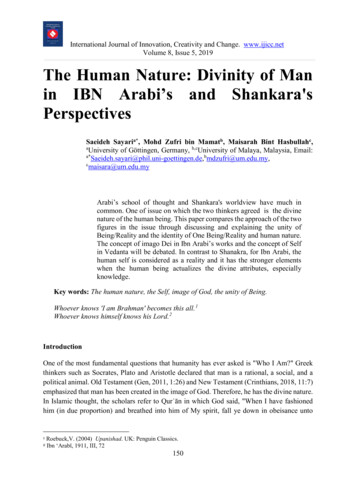
Transcription
International Journal of Innovation, Creativity and Change. www.ijicc.netVolume 8, Issue 5, 2019The Human Nature: Divinity of Manin IBN Arabi’s and Shankara'sPerspectivesSaeideh Sayaria*, Mohd Zufri bin Mamatb, Maisarah Bint Hasbullahc,aUniversity of Göttingen, Germany, b,cUniversity of Malaya, Malaysia, ufri@um.edu.my,cmaisara@um.edu.myArabi’s school of thought and Shankara's worldview have much incommon. One of issue on which the two thinkers agreed is the divinenature of the human being. This paper compares the approach of the twofigures in the issue through discussing and explaining the unity ofBeing/Reality and the identity of One Being/Reality and human nature.The concept of imago Dei in Ibn Arabi’s works and the concept of Selfin Vedanta will be debated. In contrast to Shanakra, for Ibn Arabi, thehuman self is considered as a reality and it has the stronger elementswhen the human being actualizes the divine attributes, especiallyknowledge.Key words: The human nature, the Self, image of God, the unity of Being.Whoever knows 'I am Brahman' becomes this all. 1Whoever knows himself knows his Lord.2IntroductionOne of the most fundamental questions that humanity has ever asked is "Who I Am?" Greekthinkers such as Socrates, Plato and Aristotle declared that man is a rational, a social, and apolitical animal. Old Testament (Gen, 2011, 1:26) and New Testament (Crinthians, 2018, 11:7)emphasized that man has been created in the image of God. Therefore, he has the divine nature.In Islamic thought, the scholars refer to Qurʾān in which God said, "When I have fashionedhim (in due proportion) and breathed into him of My spirit, fall ye down in obeisance unto12Roebuck,V. (2004) Upanishad. UK: Penguin Classics.Ibn ʻArabī, 1911, III, 72150
International Journal of Innovation, Creativity and Change. www.ijicc.netVolume 8, Issue 5, 2019him" (The Quran, 38:72). Thus, they consider the nature of human being as a divine entitysince God breathed into him of His spirit.One of the Muslim mystics who highlighted the divine nature of the human being is Ibn Arabi.Mentioning the hadith ‘God has created man in His image’, he has expressed and interpretedthis hadith in his various books (Ibn Arabi, 1911; Hajaj, 2006). Ibn Arabi interpreted the image(form in Islamic tradition) of God through the especial characteristics of the human being suchas knowledge and free will.For Hindu thinkers’ man is potentially the Spirit (Atma brahma ca); for them life is not a merebiological process but it is invested with great significance (Chalmers & Irving, 1965). AsChalmers and Irving (1965) mentioned, the living religion of the Hindus is the Vedantaphilosophy which is a general name for the groups of philosophical systems seeking thesystematization of the message of the Upanishads in a consistent manner.This paper deals with two thinkers Ibn Arabi and Shankara regarding the nature of the humanbeing. This paper provides an explanation of these questions by discussing at least, twoperspectives in the vocabularies of two thinkers: (1) non-dual Reality and Its relationship withthe nature of the human being and (2) the divine nature of the human being. The former isdiscussed through the theory of unity of being or unity of existence (waḥdat al-wujūd) on theside of Ibn Arabi, and the Brahman in Shankara's idea. The latter is debated through the imagoDei from Ibn Arabi’s thought and Atman from Shankara's perspective. Since there are manyterms regarding the nature of human being in Islamic tradition and Hindu philosophy, I providea brief explanation about the terms which I use in this paper.The concept of spirit, soul, heart, and selfAristotle applied ‘potentiality’ and ‘fulfillment’ for explanation of physical notions; then, heapplied the model for his psychology. Therefore, he used ‘soul’ as the first entelechy of the liveorgans (Clark, 2001). For Aristotle, soul is the form of a living thing (Hamlyn, 2002). In fact,the term ‘soul’ originated from Greek thought and then entered into the Islamic texts (Iqbāl,1934). Influenced by Greek philosophers, Muslim philosophers translated the term nafs as soul.In Persian, the term ‘nafs’ is translated to self (khud).Ibn Arabi used the term ‘soul’ and ‘spirit’ as synonyms (Ibn Arabi’s, 1911). In some of hisbooks, he said that the truth of the human being is his heart (Ibn Arabi’s, 1911) and the heartis the place of God and it has the form of God (Ibn Arabi’s, 1911). Following Chittick (1994),I use the ‘human self’ referring to Ibn Arabi’s perspective regarding the nature of human being.On the other hand, some interpreters of Upanishads and Vedanta used terms 'self' and 'soul' as151
International Journal of Innovation, Creativity and Change. www.ijicc.netVolume 8, Issue 5, 2019synonyms (Deussen, 1906). Therefore, I use term 'self' referring to the nature of human beingfrom Shankar’s perspective as well.Why is it yet important to discuss the human nature?Our era is the era of transformation of the many conceptions such as consciousness, themeaning of life, values, personal responsibility, spirituality, and suffering. While the traditionalthought emphasized the metaphysical origin of the human being, modern thought reduced it tothe reason and intelligence. Modernity extolled the human reason while postmodern showedits relativity. Frankl (1970) wrote that reductionism which is the production of modernismreduced the phenomenon of human being to his parts. He added that the reductionismundermined the comprehensive meaning of the humanity and changed the symbol of humanityto some meaningless signs. Postmodern paradigm came to debunk the ideas of modernism andtraditionalism. Then, for postmodern paradigm, there is no self (soul) outside the endlesscontingencies of history, context and culture. There is no unitary self or soul within postmoderntheories. Our positions, consciousness and beliefs are all multiple, subjective and analysable(Donner, 2010). The critiques of postmodern theories led to lose the unifying narrative of ourworld and our self and to reduce the knowledge and experience to the subjective realm. Newparadigm aims to reintegrate the self with the discoveries of science through reconceptualizingof the self who suffered from the alienation of modernity and fragmentation of postmodern.The problem of postmodernism is the fragmentation of meaning and the loss of a narrative thatconnects us to the world and to each other. This leads to the emptiness of the self. Searchingthe meaning of the human self, new circles of western scholars are interested in the easternculture specially mysticism. Some famous people such as Capra in biology, and JohnPolkinghorne in Physics are just a few examples. Louis Hoffman in toward a sustainable mythof self, says “we need a myth of self. Myth here is not something that is false, but rathersomething that cannot be proven true” (Hoffman et al., 2008). Diversity and tolerance areacknowledged, but yet the problem is to integrate diversity in a holistic way. The culturalrelativism suffered from a discontinuous narrative which cannot explain an integrated self.The only one Reality: Ibn Arabi’s and Shankara's agreement of the unity of RealityIn this part, two theories of two thinkers are going to be examined alongside one another: IbnArabi’s theory of the unity of being, and Shankara's non-dual Reality. Ibn Arabi and Shankara,both developed a monistic paradigm finding relationship between the single Reality and theworld including the human being. Neither of the two seems willing to consider a room forreality save the Absolute Reality.The most fundamental cornerstone of Ibn ‘Arabi’s school is the theory of unity of being. Hesaid, "there is no existence save God .there is no being but Allah"( Ibn Arabi, 1972, p. 85).152
International Journal of Innovation, Creativity and Change. www.ijicc.netVolume 8, Issue 5, 2019The existence just belongs to God and every other thing is His manifestation. Then, the onlyBeing has some levels. Ibn Arabi mentioned three levels of Being. In Fuses, Ibn ‘Arabipropounded three levels of unity: unity of Essence (Aḥadiyya) which is the absolute withoutany constraint, unity of divinity (ulūhiyya) which is the level of knowledge of divine namesand attributes, and unity of lordship (Rubūbīyya) which is the unity of the actions (Af‘āl) andevery existent is a manifestation of one of the divine names (Ibn Arabi, 1946). It means allthings return to God or God includes all things. William Chittick believed that Ibn Arabitypically called God wujūd which is usually translated as 'being' or 'existence' (Chittick, 2005).Therefore, being or existence for Ibn Arabi belongs to God (Ibn Arabi, 1911); he usually usedthe Real (Ḥaqq) referring to God. Ibn Arabi used the term Al-ʾays ʾays ( )اﻷﯾﺲ to refer toexistence which he called the Real (Ibn Arabi, 1911). Then, he mentioned that creatures, whichwere attributed to the non- existence ( )ﻟﯿﺲ in the past and will be attributed to that in thefuture and are attributed to existence ( )اﻷﯾﺲ in the present time, are essentially non-existence(Ibn Arabi, 1911). For Ibn Arabi and in Arabic terminology, the term wujūd (existence orbeing) means presence, awareness and finding (Ibn Arabi, 1911).The finding has two sided: the finder (knower here) and the known. Based on this terminology,'God is Existence' means God is present, and God is aware. The question is that what God isaware of, and whom God is present to. For Ibn Arabi, the answer is God; God is present forHimself, and He is aware of Himself, and He finds Himself. From here, Ibn Arabi offered somelevels (Martabah) of divinity: the divine Essence, and the divine names and attributes. Thedivine Essence finds the divine names and It is aware of them. This classification also helpsIbn Arabi connect the creatures to God. There is no explanation, definition, and expression ofGod in the divine Essence (Aḥadiyya); it is the level of Absoluteness which is hidden foreverfrom all creatures.The level of divine names and attributes is the root of all creatures and cosmos (Ibn Arabi,1946). In the beginning of the Fuṣūṣ, Ibn ‘Arabi discussed that God wanted to see Himselfthrough other not through His Essence. Therefore, he created the universe which includes allHis names, but the universe manifests all the names separately (Ibid). The universe is not outof God. For understanding the issue, we need to understand another theory in Ibn Arabi’sthought, namely the immutable entities (al-ʾa‘yān al-thābitah). Immutable entities are in thestage of the manifestation of the Essence in Himself and for Himself; in this stage, theknowledge of all things, which was hidden in the divine Essence, is revealed to the Essence. Inother words, when the divine Essence sees ( knows manifests Himself through Himself)Himself, the divine names and attributes are disclosed before God since they were hidden inthe level of Absoluteness (Ibn Arabi, 1946). Now, they are clear and distinctive before Godalthough they do not know each other yet; to know each other and to be distinctive they needto be actualized in the concrete world. Then, they come to the objective world and leave theirpermanence (thubūt). In a meaningful way, the universe is an illusion within an illusion (khayāl153
International Journal of Innovation, Creativity and Change. www.ijicc.netVolume 8, Issue 5, 2019fī khayāl) (Addas, 1993). God actualizes them one after another up till infinite. Thisconsequence is not meaningful in relation to God because it is a united event for Him. Godnever changes the form of the immutable entities, but He existentiates them and they experiencethemselves as what they were for the first time till eternity (Ibn Arabi, 1972, p. 85).Ibn Arabi’s system of thought is based on the oneness of Being and a quantity of Hismanifestation. Therefore, the universe which is His manifestation in the objective world hasbeen in His knowledge from the eternity. The immutable entities are considered as the divinenames regarding their relationship with God and they are potential entities in the knowledge ofGod concerning the creatures. Shankara, likewise, developed his system of thought based onthree propositions: 1) the Brahman is the only Reality, 2) Atman is the same as Brahman, and3) empirical world is unreal and illusory (Buch, 1921). From Shankara's point of view, theOnly truth is Brahman, and the world is an illusion. "Now this subtle principle, all thisphenomenal universe has that for its essence; that is the only Reality, that is the only Self. thatthou art, O śvetaketu" ( Roebuck, 2004). This ultimate Reality cannot be expressed by anyword nor perceived by any concept (Saraswati, 1957). Shankara used 'only Self' to refer toultimate Reality; this Self has no distinctive feature. The key concept of Brahman is derivedfrom brh meaning to grow or to bloom. This is connected with development. This can be asymbol that stands for the magical potency to achieve one's highest destiny (Masih, 1982).Based on the other interpretation, Shankara derived the word Brahman from the root brathiwhich refers to eternity or purity (Lang, 2011). Shankara used the term 'non-dualism' to referto the Brahman and Atman since he wanted to reject any distinction between Brahman andAtman. From his idea, the concept of nirvana (salvation) is connected to the concept ofbondage; he mentioned that nirvana means to unite with ultimate Reality or Brahman.Therefore, the only doctrine of Upanishads, according to Shankara, is the doctrine of unity(Ibid).The ultimate Reality can be perceived through two different standpoints: absolute and relative;from the standpoint of absolute, the ultimate Reality is considered as the undifferentiated unitywhich let be known without any quality. On the other hand, from the relative standpoint, theultimate Reality manifests itself through conditioned knowledge (Brück, 1991). In the next partof this
Ibn Arabi used the term ‘soul’ and ‘spirit’ as synonyms (Ibn Arabi’s, 1911). In some of his books, he said that the truth of the human being is his heart (Ibn Arabi’s, 1911) and the heart is the place of God and it has the form of God (Ibn Arabi’s, 1911). Following Chittick (1994), I use the ‘human self’ referring to Ibn Arabi’s perspective regarding the nature of human .
